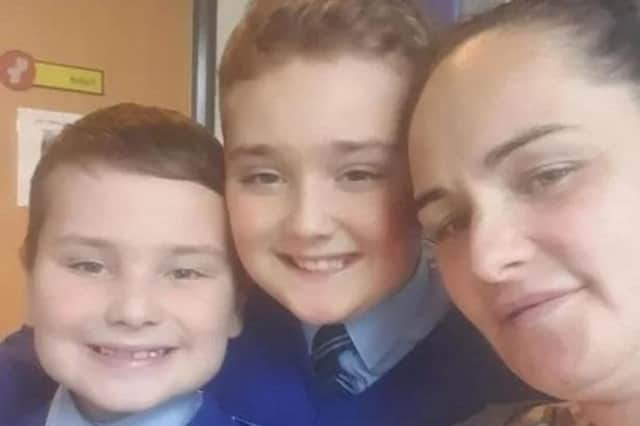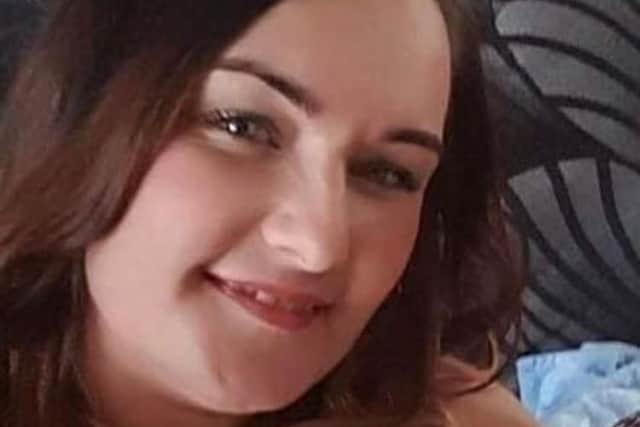Tragic mother, 33, who died after childbirth in Sheffield had symptoms that should have been investigated, coroner rules


Today (April 30) a coroner concluded the inquest into the death of Susan McLoughlin, 33, of Liverpool, who died minutes after undergoing a caesarean section at Royal Hallamshire Hospital and giving birth to her baby daughter Leila.
Susan, who underwent the procedure at 36 weeks pregnant on October 21, 2019, entered into cardiac arrest and died as a result of pulmonary hypertension – a rare form of high blood pressure affecting the lungs and heart.
Advertisement
Hide AdAdvertisement
Hide AdShe had only been diagnosed with the condition – which has between a 10 and 30 per cent mortality rate among pregnant women – nine days beforehand, and had been transferred from Aintree Hospital in Liverpool to specialist care in Sheffield on October 16.


Assistant coroner Katie Dickinson heard from pathologist Professor Kim Survurna that after Susan gave birth the circulation in her body ‘changed dramatically’.
The inquest heard that Susan’s blood pressure dropped significantly once the C-section was completed and she was given anti-clotting (thrombolytic) drugs to help with the seperation of the placenta from her uterine wall.
Dr Tessa Bonnet, consultant obscetrician at the Royal Hallamshire Hospital, said that this is an important procedure although it does increase the risk of severe bleeding. Because of this, and because Susan was known to have pulmonary hypertension, she was only given a very small dose.
Advertisement
Hide AdAdvertisement
Hide AdHowever, Dr Robin Condliffe, consultant pysician in the pulmonary hypertension unit in Sheffield said that Susan’s bleeding “was made worse by the thrombolytic drugs she was given.”
The court heard that Susan’s pulmonary hypertension meant that her body was unable to cope with the sudden changes to her circulation and her heart failed.
When questioned by Mary Newnham, legal counsel for Susan’s family acting for Sheffield-based Medical Solicitors, Dr Condliffe also said that had the unit in Sheffield been able to treat Susan for pulmonary hypertension sooner, her chances of survival may have been higher.
He said that at the specialist unit in Sheffield, 27 out of the 30 pregnant women with pulmonary hypertension they have treated survived pregnancy. The unit was able to manage their blood pressure in the time up to their due date.
Advertisement
Hide AdAdvertisement
Hide AdHe said: “It is very difficult to be 100 per cent sure. In an ideal world we would have carried on treatment for several months before we delivered, but we couldn’t do that.
"The mortality rate is still high but it is a reasonable assumption that the risk of [Susan] dying would have been lower. [An earlier diagnosis, leading to earlier treatment] would have increased her chances of survival.”
The inquest heard that on three occasions before Susan’s transfer to Sheffield, opportunities to diagnose her condition were missed.
An electrocardiogram (ECG) taken when she presented at Aintree hospital with flu symptoms in 2015 was noted to be abnormal and ‘tachy’(increased heart rate).
Advertisement
Hide AdAdvertisement
Hide AdSpeaking at the inquest, consultant cardiologist Dr Homeyra Douglas said that the abnormal readings from the ECG in 2015 ‘should have rasied alarm’.
In April 2019, while nine weeks pregnant, Susan again attended Aintree Hospital after losing consciousness as she was running with a pram to catch a bus.
Another abnormal ECG result strongly suggested there was a problem with the right side of her heart but, again, a referral for cardiology opinion was not made.
Susan also attended an out of hours GP in June 2019 who requested her usual GP refer her to have another ECG. This was never picked up on.
Advertisement
Hide AdAdvertisement
Hide AdAssistant coroner Katie Dickinson found that the abnormal ECG findings in both September 2015 and April 2019 should have been referred to a cardiologist for investigation.
She also found that the request by the out of hours GP for Susan’s regular GP to refer her for an ECG was not acted upon.
"All if the above findings were missed opportunities to carry out further investigations with a cardiologist,” Ms Dickinson said.
"It is not clear whether these missed opportunities would have changed the outcome,” she added.
Advertisement
Hide AdAdvertisement
Hide Ad“But there were missed opportunities to investigate the abnormal ECGs which may have identified the pulmonary hypertension that was the cause of her death.”
Speaking on behalf of Liverpool University Hospitals, Dr Nikhil Sharma explained to the coroner that a number of improvements had been made to ensure that a repeat of Susan’s case did not happen in the future.
These include ensuring all ECGs are read by senior doctors, and all doctors are trained to recognise abnormalities and when to rasie them with cardiologists.
Dr Katie Wilson, Susan’s GP at Strand medical centre in Bootle, also explained that the system around receiving referrals from out of hours GPs was being reviewed.
Advertisement
Hide AdAdvertisement
Hide AdThe coroner said that she was satisfied that the necessary changes had been identified by both the Trust and the GP Practice, and were being implemented, and commended them on this.
Assistant coroner Dickinson found that Susan McLoughlin died following a planned caesarean section after going into cardiac arrest caused by pulmonary hypertension.
Susan is survived by her partner Jason, their four children Liam, Jake, Jamie and Leila, her mother Sylvia, her sister Wendy, John and her brothers Stephen and Peter.
Representing the family, Matthew Brown, senior legal executive at Medical Solicitors, said: “It has been very hard for Susan’s family, not only to try and deal with their grief, but also to learn that things could and should have been very different.
Advertisement
Hide AdAdvertisement
Hide Ad“Susan was let down by those she turned to for help. Whilst there is some relief from hearing how things have changed at the hospital and the GP surgery because of investigations undertaken, this is of little solace to a partner and four young children deprived of their loving and caring mother.”